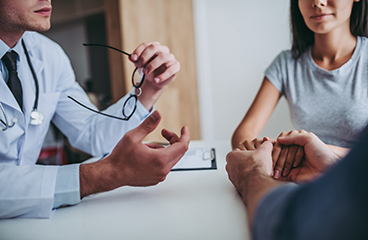
What methods can be used to get pregnant when one partner has HIV?
If you and your partner want to become pregnant and one of you is HIV-positive, talk with your doctor before you try to get pregnant. There are ways you can lower your risk of passing HIV during the pregnancy. The ways your doctor suggests may depend on which of you is HIV-positive.
Your doctor can help you choose options that support your goals and lower your risk.
Sex without a condom
If you choose to have sex to get pregnant, your doctor may suggest things you can do to lower the risk of passing HIV. The doctor may suggest one or more of these methods.
- Suppress the viral load. This means taking antiretroviral medicine to make the HIV-positive partner's viral load too low to detect. Viral load is a measure of how much HIV is in the blood.
- Use PrEP. This is medicine that the partner without HIV can take. It can help prevent an HIV infection.
- Have sex without a condom only during the few days when getting pregnant is most likely. You may want to use an ovulation kit to help you figure out when these days are during the menstrual cycle.
Pregnancy without sex
There are options for getting pregnant that don't involve sex. They can also limit the risk of passing HIV. Sometimes these methods are combined.
- Assisted reproductive technology (ART). These are medical procedures that help with getting pregnant. Two of the most common are:
- In vitro fertilization (IVF). During IVF, eggs and sperm are mixed in a lab to fertilize the eggs. Then one or more of the fertilized eggs are put into the uterus or fallopian tube.
- Intracytoplasmic sperm injection (ICSI). In this method, a single sperm is injected into an egg. The fertilized egg is then placed in the uterus or fallopian tube.
- Artificial insemination. It can be done as:
- Intrauterine insemination (IUI). This is a medical procedure. First the sperm is specially washed. Then it is placed into the uterus.
- Home insemination. This involves using a syringe to put HIV-negative semen into the vagina.
- Donor sperm. This is an option if your partner does not have sperm or you want to use sperm from someone who is HIV-negative.
Follow-up care is a key part of your treatment and safety. Be sure to make and go to all appointments, and call your doctor if you are having problems. It's also a good idea to know your test results and keep a list of the medicines you take.
Where can you learn more?
Go to http://www.healthwise.net/patientEd
Enter H135 in the search box to learn more about "Learning About Planning a Pregnancy When One Partner Has HIV".
Current as of: September 30, 2025
Author: Ignite Healthwise, LLC Staff
Clinical Review Board
All Ignite Healthwise, LLC education is reviewed by a team that includes physicians, nurses, advanced practitioners, registered dieticians, and other healthcare professionals.

